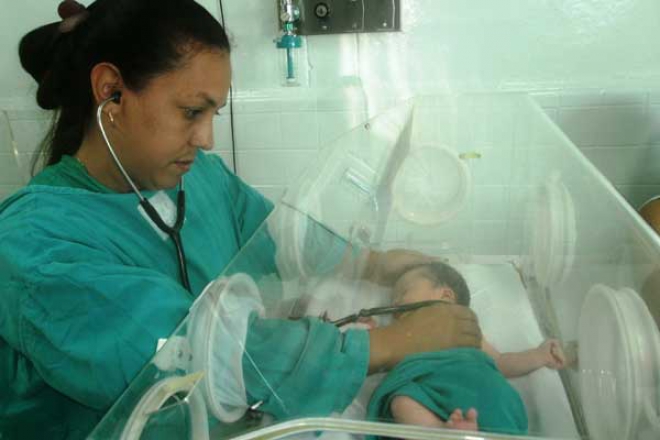 The current infant mortality rate of 3.19 per thousand newborns and the 24 months accumulated without maternal deaths show the sustainability of the work, but there are still areas to be strengthened in order to improve the indicators and complete the calendar with an index lower than 3.0.
The current infant mortality rate of 3.19 per thousand newborns and the 24 months accumulated without maternal deaths show the sustainability of the work, but there are still areas to be strengthened in order to improve the indicators and complete the calendar with an index lower than 3.0.
Las Tunas, Cuba.- The operation of the Maternal and Child Program known as PAMI by its Spanish acronyms and the epidemiological situation of arbovirus were subjects of analysis during the productive meeting held by the Minister of Public Health, José Ángel Portal Miranda, with health authorities in the territory.
The current infant mortality rate of 3.19 per thousand newborns and the 24 months accumulated without maternal deaths show the sustainability of the work, but there are still areas to be strengthened in order to improve the indicators and complete the calendar with an index lower than 3.0.
The minister and the executives of the Ministry of Public Health who accompanied him at the meeting confirmed the need for the prevention and timely diagnosis of congenital malformations, one of the causes of children deaths here. The use of folic acid and the comprehensive approach from Primary Health Care are essential to modify this scenario.
At the same time, it is urgent to reduce teenage pregnancy, whose prevalence is higher than the national average, according to Portal Miranda. Currently, just over 20 percent of pregnant women in Las Tunas are teenagers and several of them at extreme ages, 12 and 13 years old.
In this regard, he insisted on the importance of involving the different areas of society to transform such a scenario, which entails complications in pregnancy and childbirth, abortions with future infertility problems.
Precisely, this group provides a significant number of underweight newborns, which is another of the main reasons for infant mortality. It is also caused by preterm birth and delayed intrauterine growth, associated with chronic diseases such as hypertension. Hence, the imperative need for better control of preconception risk.
No less important is the confrontation to the drop in birth rate, which according to Dr. Luis Manuel Pérez Concepción, provincial director of the Health Department, this year the lowest number of births has occurred since 1976, while the population is aging rapidly. Demographic dynamics is a real challenge for the sector, so we must optimize the attention to the infertile couple.
According to the minister, in the Balcony of Eastern Cuba there are conditions to strengthen the Primary Health Care, and prepare doctors and nurses to achieve the expected results; as well as to encourage students to study the specialty of Obstetrics, with the purpose of guaranteeing relief and strengthening work teams.
In a second moment of the exchange, it was known that the province continues intensive surveillance of arbovirus, specifically dengue, which manifests significant morbidity in recent weeks.
The most affected health areas are those belonging to the polyclinics Gustavo Aldereguía and Manuel (Piti) Fajardo, followed by Aquiles Espinosa and Guillermo Tejas in the main municipality, the "Romárico Oro" in Puerto Padre and five communities in Majibacoa.
The executive warned about the danger that dengue represents for life and how much efforts is required to gather wills in this fight. He urged to solve this panorama, taking into account that the most favorable months for the increase of the Aedes aegypti mosquito are approaching.
With this intention, it is necessary to achieve a greater organization of the surveillance system, keep the community search, conduct sanitary hearing, mobilize the workers of the sector and make available to the polyclinics the most experienced doctors. Simultaneously, good use of resources must be made and the quality of focal treatment and mitigation of this mosquito must be guaranteed, as well as sanitation in the most risky places.
The meeting was also chaired by Manuel René Pérez Gallego, first secretary of the Party in the territory, and Jaime Chiang Vega, president of the Provincial Assembly of Popular Power.





